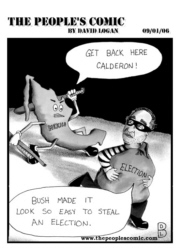|
||||
|
|
|
|||
| Home | Subscribe | Back Issues | The Organization | Volunteer | Do Something | ||||
|
||||
|
Fishing for a Good Candidateopinion by Doug CollinsThis issue, a WA Free Press writer was prepared to research an article on the money behind the various statewide electoral races, but he had an unexpected hospital stay, and was not able to do it. I wish him a speedy recovery.Taking the Chinese proverb to heart "It's better to teach someone how to fish than to give them a fish," I thought that it would be good to instead provide some general tips for voters. Background scoops For campaign finance records, the single most useful website is probably www.followthemoney.org , put out by the Institute on Money in State Politics. It's easy to compare finance information, including finance sources, even for candidates in smaller state-legislative races. It unfortunately does not compile records on state ballot measures, at least not for Washington. After a fair amount of surfing, I gave up on Washington's Public Disclosure Commission website, www.pdc.wa.gov . It's good for campaign finance data on past races, but I could not find data on current races, though I'm sure an intrepid researcher could certainly squeeze this info out of the PDC. Project Vote Smart (see www.vote-smart.org ) is an ambitious project to compile both qualitative and quantitative data on elected officials and candidates. Information on incumbents in federal races is thorough, but for non-incumbent candidates and for local state-legislative races the information is very scant. The organization's website says it is working on a new database of voting records for state legislatures, which could be a useful tool. Voting strategies I am often surprised that many people are concerned with choosing a "viable" candidate in the September primary. It seems to me that the primary is not usually the time to restrict your vote to the better-funded or better-known. Besides the incumbents or otherwise-anointed candidates, there probably is a lower-profile candidate that speaks better to the issues that you hold dear. The primary is probably the time to vote for him or her, if only to record your disenchantment with the incumbent on an important issue, for example the war. The final election can be a much narrower matter. In the current style of Washington finals, minor party candidates can sometimes-though it is rare-be "spoilers" when the major-party rivals are running very close. This problem comes from an antiquated and mal-productive glitch in our state election system: the lack of a true runoff election. The easy solution for this is not to discourage minor parties (on the contrary, they should be encouraged) but to adopt Instant Runoff Voting. IRV-which will be considered in a ballot measure by Pierce County voters in Novermber-allows voters to choose first and second preferences for a race that can include many candidates. If no candidate gets an outright majority on the counting of the first preferences, then the ballots of the lowest-scoring candidate are then redistributed to the remaining candidates based on the second preferences. If still no remaining candidate has a majority, the process is repeated until one candidate does. IRV can even potentially eliminate the need for a September primary election. Propaganda, better and worse Personally, I find the State of Washington Voters Pamphlet election guides extremely useful in making decisions. For initiatives and referenda, these pamphlets provide not only informative and fair pro/con statements but also lists of the main supporters of each side. These pamphlets also put candidates on equal grounds. That's great. I used to vote in Florida, where no such pamphlets existed, and I've always appreciated the fact that Washington does a good job on these. I feel that newspaper endorsements are generally too influenced by the publishers, who are themselves heavily influenced by the local Chamber of Commerce. The slick, glossy mailings that politicians send this time of year are filed quickly into my garbage can. They are largely the product of various image consultants, some well-meaning and some not. The mailings themselves, however, say more about a candidate's coffers than about a candidate's character. And TV ads? For goodness sake, I hate to be blunt, but what are you doing watching commercial TV?. Black-box voting Lastly, I should mention that it is not very obvious that ballots around the state and country are counted accurately or honestly. If international observers monitored our elections, would we pass? Given our national loosey-goosey approach to local election regulation, and the prevalence of secret computer counting with no verifiable paper trail, that would be doubtful. To keep abreast on vote fraud issues, there is an in-state website www.WAfairelections.org , and there are also www.votersunite.org and Renton-based Bev Harris's famous www.blackboxvoting.org .¥
|
|

